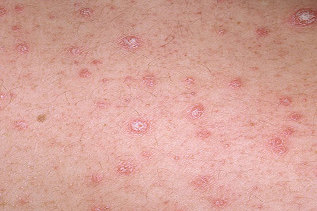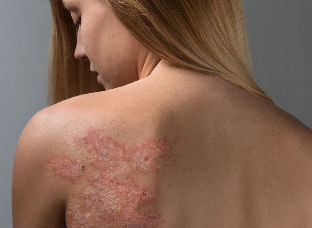
Psoriasis affects about 4% of the world population. It can develop at any age at the time of birth to old age, but most of all, the psoriasis "loves" the young. As evidenced by the fact that 70% of patients with psoriasis at the age of 20 years.
Symptoms of psoriasis: itching, rash, desquamation
Contact person: dermatologist
The analyses and investigations: skin biopsy
Methods of treatment: cryotherapy, PUVA-therapy, plasmapheresis
Psoriasis is a disease chronic non-communicable a disease that often manifests itself in the form of rashes and peeling of the skin.
Psoriasis affects about 4% of the world population. It can develop at any age at the time of birth to old age, but most of all, the psoriasis "loves" the young. As evidenced by the fact that 70% of patients, of patients with psoriasis at the age of 20 years.
If the skin became rash-like psoriasis – it is necessary to consult a dermatologist. Rashes represent peeling and itching of the wafer of different sizes. When this insert in the psoriasis may be placed on the elbows, knees, scalp, or other parts of the body. The doctor will be able to deliver an accurate diagnosis and, depending on its form, a treatment.
The causes of psoriasis
Psoriasis is an abnormal response of the body to external stimuli, in which the parcels of the body from the upper layer of the skin dies a lot faster than normal. If usual, the cycle of division and maturation of cells of the skin occurs in 3 to 4 weeks, in the case of psoriasis, this process occurs in only 4-5 days.
At the present time the psoriasis consider hereditary multifactorialnyh of the disease: the disease is not the only one, and a complex of reasons immunological changes in metabolic, endocrine disorders and neurological disorders. When this thing is for sure psoriasis is not infectious, and therefore is not a contagious disease.
The reasons of occurrence of psoriasis up to now, was ultimately not found. On this account there are different theories.
According to one theory, there are two types of psoriasis:
• Psoriasis type I is called transmissible by inheritance of a failure of the immune system. This form of psoriasis suffer from about 65% to men, in which the disease manifests at a young age, from 18 to 25 years.• Psoriasis type II occurs in people over 40 years of age. With this type of psoriasis is not hereditary and is not related to a failure in the cells of the immune system. And, unlike psoriasis, type I, which like the skin, psoriasis type II occurs most frequently in the nails and joints.
According to another theory, the cause of psoriasis are exclusively of the infringement of the immunity, caused by many different factors: it could be stress, or infectious disease, or cold, or a bad power supply. For example, it is mentioned that alcohol can cause exacerbation of psoriasis especially beer, champagne, spirits. The consumption of products containing vinegar, pepper, chocolate, deteriorates also the course of the disease and can cause a worsening of psoriasis. According to this theory, psoriasis is a systemic disease. This means that in the event of serious violations in the functioning of the immune system, the process can spread to other organs and tissues, for example, on the joints. As a result, it can develop psoriatricheskii arthritis, which is characterized by the defeat of the small joints of the hands and feet.
The symptoms of psoriasis

The symptoms of psoriasis are inflamed, peeling patches of red color, accompanied by strong itching. These spots (plate) are located on the scalp, knees, and elbow joints, in the lower back and in places the folds cutans . About a quarter of patients affected nails.
According to the seasonality of relapses (worsening of disease), there are three types of psoriasis: winter, summer, undefined. The most commonly of the winter type of psoriasis.
In the period of exacerbation of the manifestation of psoriasis on the hands, on the knees, on the head, as well as in the lower back and in places the folds cutans act in the form of plates of a reddish colour. Their dimensions vary from a pinhead to large areas of size in the palm of the hand, and more.
Skin rashes are usually accompanied by peeling of skin, and painful itching. In the process of peeling of superficial scales are more dense, located in the depth (hence the second name of psoriasis — flakes moth). Sometimes, in the field of skin lesions, cracks, fissures and suppuration.
For a worsening of the psoriasis characterizes the phenomenon called Kebnera: the development of plaque in the places where wounds or scratches of the skin.
About a quarter of patients affected nails. You experience the projectors of the deepening and tracking of the plates. In addition, the nails may utolzhatsya and crumble.
In the summer, under the influence of the solar rays, in patients with winter is a form of psoriasis symptoms disappear, and sometimes even disappear. The ill years of a form of psoriasis, on the contrary, it is recommended to avoid sun exposure, because it degrades the course of the disease.
The diagnosis of psoriasis
Diagnose psoriasis dermatologist. For him, it is necessary to request that at the appearance on the skin lesions similar to psoriatic — plaques of different sizes, red, itchy, and flaky. To refine the diagnosis may require a biopsy of the skin.
The treatment of psoriasis
If the doctor has revealed psoriasis of the initial phase, it is quite possible, you will be assigned mainly to prevention, and not to the remedies.
When manifestations of the illness apply the methods of treatment of psoriasis:
• cryotherapy — method holodovogo of the impact;• plasmapheresis - purification of blood;
• the processing ultraviolet — treatment is short-term procedures similar to visit the solarium. For more effectiveness, in the treatment of psoriasis, this method is often combined with the intake of special drugs by PUVA-therapy).
In any case, do not try to themselves do the treatment of psoriasis with ultraviolet light without the advice of your doctor. In psoriasis, a small dose of uv rays are therapeutic and high, on the contrary, can podhlestnut the development of the disease. The same thing applies to the sun, the thermal baths.
Unfortunately, until that person knows how to cure psoriasis completely, because the body retains the memory of the disease in the form of biochemical, immunological and functional changes. The relapse of psoriasis can occur at any time, so that patients with such a diagnosis needs to be constantly observed by a dermatologist.
























